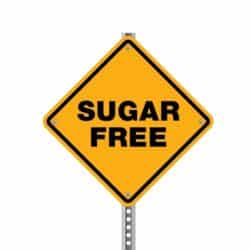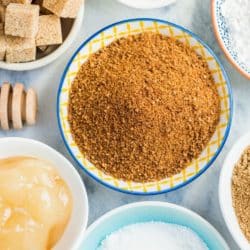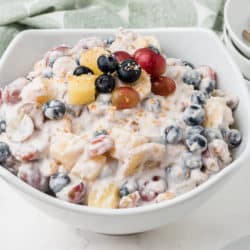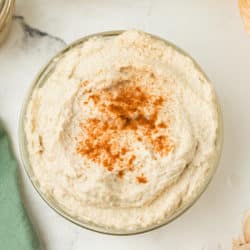10 Tips to Beat Sugar Dependency for Good
Cravings for sugary treats can throw off your plan to eat healthier or lose weight. This article includes 10 ways to beat a sugar addiction for good. Say goodbye to sugar dependency and cravings!

You’re Probably Eating Too Much Sugar
The average American is consuming too much sugar which can lead to health issues including heart disease and obesity.
Sugar plays a huge role in our lives. Added sugars are present in most processed foods and restaurant meals, even ones that don’t seem sweet.
While it’s obvious that foods like ice cream and cookies have added sugar, you may not realize that foods like salad dressings, ketchup, breakfast cereals, fruit juice, and most restaurant foods have added sugar.
If you’re you’re eating a lot of packaged foods and not reading labels, you’re probably over-consuming sugar. Even if you’re eating a healthy diet, you can still may have an issue with sugar intake, sugar dependency, and cravings.
The problem is that it can very extremely hard to avoid the cravings for sugar, especially if you’ve been eating a lot of it.
This article shares some of the long-term strategies from breaking the sugar dependency cycle and getting rid of the cravings. I also share my experience with sugar addiction and how I broke the cycle.
Sugar Addiction & Dependency
There is no doubt that for the majority of people, sugar can cause addiction-like symptoms.
Obsessing over sugar, being unable to moderate your intake, and experiencing withdrawal symptoms without it are all good markers that you have an addictive pattern with sugar consumption.
Why is sugar so addictive?
Sugar consumption, like that of all hyperpalatable foods, triggers our brain’s reward system. A release of dopamine and a rise in serotonin associates these foods with pleasure, and rewires our brain to crave more of them to continue releasing dopamine.
Quitting sugar is sometimes more than breaking a habit or a matter of willpower – it is breaking an addiction.
Sugar addiction is more comparable to that of nicotine or caffeine addiction that that of a drug addiction. Others think that sugar addiction is a psychological addiction rather than a physical addition. However, that doesn’t decrease the significance of the addiction or dependency.
Please note, that with any sort of addiction or dependency, it’s important that you work with a professional healthcare or mental health provider.
The information in this article gives an overview of how to break a sugar addiction, but it’s always best to consult with your provider to develop a plan for your individual situation.
Symptoms of Sugar Addiction
If you’re still unsure if you’re addicted to sugar, consider the possible symptoms below:
- Intense sugar cravings. If you need something sweet to finish off your meal or experience a need for sugary snacks in the afternoon or at night, you might be fighting a sugar addiction. Thinking about sugary treats between meals and obsessively searching for new dessert recipes can be a sign of sugar addiction. What’s even more frustrating is that these obsessive thoughts about eating something sweet can occur at times when you aren’t even hungry!
- Carbohydrate cravings and loss of moderation control. A sugar addiction can also manifest as intense carb cravings, such as wanting a giant bowl of pasta. Carbohydrates convert to glucose (sugar) in our bodies and have a similar reward effect in our brains.
- Withdrawal symptoms. If you experience irritability, headaches, a racing heart, stomach issues, muscle tremors, or sweating in the absence of sugar, those are signs of sugar withdrawal.
Tips to Break a Sugar Addiction
But, these ten tips should help get you started on the right path for addressing your sugar addiction, stopping the cravings, and, ultimately, finding freedom.
1. Consider using an addiction or substance abuse therapist
Having support is an important part of breaking a dependency on anything, including sugar. A therapist or a dietitian can provide strategies to manage stress and make breaking your addiction a success.
It’s also important to make sure that you don’t just go from one addiction to another. For instance, you don’t want to cut out sugar from your life only to start a caffeine addiction or smoking cigarettes.
Working with a professional therapist is really important to help stay addiction-free.
2. Consider a sugar detox
A sugar detox can mean anything from cutting sugar out completely to phasing it out slowly. Another type of sugar detox might mean avoiding added sugars, but still allowing for natural sugars from fruits.
The bottom line is that you should make a plan for what kind of sugar detox is best for your lifestyle and health needs.
This means avoiding sugar for anywhere from 3 to 30 days, or even longer. This includes avoiding artificial sweeteners and all hidden sugars.
With time, your tastebuds will reset and even natural sugars will taste sweeter and be more satisfying. You may even find that you lose your sweet tooth and you don’t crave that afternoon sweet treat anymore.
Learn more about how to do a sugar detox.
3. Address past or current stressors that might be causing dependency
At least one study showed that sugar dependency and cravings are not necessarily about the sugar itself, but may be caused by environmental stressors and situations.
This means that you are experiencing stress in your life and using sugar to help comfort yourself.
One way to manage sugar cravings is to make it a point to be present with yourself and tune into your patterns. Do you always reach for sugar after a stressful day? Do you experience a craving after you encounter a trigger for a past trauma?
Awareness of when and why cravings occur is the first step in freeing yourself from them. You may need to seek assistance from a licensed therapist or even medical advice to help manage your stress hormones.
4. Consider complete avoidance
Depending on your personality type, completely cutting sugar and sweet foods can help break your addiction.
Remove any sugar and sweet foods from your home–make it a family effort, if necessary. Cutting out or reducing sugar will probably benefit everyone in the house.
If you are going 100% sugar-free, then you’ll probably need to avoid sugary foods, limit natural sugars including high-sugar fruits and sweeteners, and maybe even avoid sweeteners. Instead, focus on protein-rich foods and even try adding more healthy fats into your diet.
Learn more about what you can eat on a no sugar diet.
5. Be gentle with yourself
Remember that you are breaking an addiction that is probably not even your choice–the majority of Americans are raised on sugar.
You’re undoing years of programming. Be proud that you are undergoing this and improving your health. Celebrate the wins and support yourself during missteps.
6. Replace the habit
If you are getting rid of added sugars in your diet, then you don’t want to trade one addiction for another.
Instead, be mindful of the difference between a habit and an addiction. If it serves you, consider replacing dessert with an after-meal walk or a cup of herbal tea.
The point is that you get used to a healthier habit during times when you used to depend on sugar.
7. Ensure micronutrient sufficiency
If you’re deficient in micronutrients like vitamins and minerals, that can lead to sugar cravings.
By working with a functional health practitioner who is skilled in nutrition, you can determine what nutritional deficiencies you have through lab testing, and then change your diet accordingly.
Try to focus on whole foods and real food made without pounds of sugar.
Supplementation can also help to ensure micronutrient sufficiency which can prevent sugar cravings and addiction.
See my recommendations for the best supplements for women over 30 and women over 50.
8. Eat enough protein and healthy fats
Fat and protein satiate our bodies and keep blood sugar levels stable.
Experts suggest eating a breakfast high in protein, and choosing snacks that have a nice balance of protein and healthy fats.
Protein-rich breakfast foods include eggs, sausage, cottage cheese, yogurt, Protein Overnight Oats, or smoothies made with clean protein powders.
A balanced diet should lead to a decrease in sugar cravings. Learn more about how to eat clean, eating healthy on a budget, and get my healthy shopping list.
9. Conversely, eat enough carbs and enough in general
Under-eating carbohydrates for too long can also cause your body to crave starch and sugar to produce glucose.
Your body actually needs carbohydrates to fuel your body and brain with energy.
Choose complex carbs like sweet potatoes, brown rice, and lots of vegetables. Shoot for several servings a day which can help limit your cravings for simple sugars like treats.
If you’re on a gluten-free diet, see my list of the best gluten-free carbs.
10. Get enough sleep
Believe it or not, but not getting enough sleep can cause junk food cravings.
Sleep deficiency can reduce insulin sensitivity and increase stress hormones, which both contribute to imbalanced blood sugar and subsequent sugar cravings.
Aim for 7-9 hours of uninterrupted sleep a night. If you are having trouble getting quality sleep, work on your sleep hygiene and do whatever it takes to get improvements in sleep.
FAQs
The most important things when breaking a sugar addiction include having a gameplan and having a support system. This is an excellent time to examine your thoughts and patterns and how they contribute to your habits and any other addictions.
And, of course, it’s important to work with your healthcare provider to determine a recovery plan that meets your individual needs.
It is possible that sugar cravings may be related to a nutritional deficiency.
Under-eating any macronutrient can lead to sugar cravings. The same goes for micronutrients. In this case, it’s best to work with your healthcare provider to determine what specific deficiencies you might have.
For more support on going sugar-free, you are invited to join my Sugar Free Challenge. You may also want to read my article with the best sugar-free diet benefits for your health.
My Experience with Sugar Addiction
I have a lot of empathy for anyone dealing with addiction, as I have experienced sugar addiction in the past.
My addiction was in conjunction with an eating disorder, and it took a lot of work to repair my relationship with food and with sugar.
But, I can say that it is possible to find long-term recovery and to develop a healthier relationship with food. After breaking my sugar addiction with a 30-day sugar reset, I am now able to enjoy treats in moderation and without guilt or binging.
Read more about my clean eating before and after story.
Don’t Miss These Sugar-Free Resources
Conclusions
If you have strong sugar cravings on a daily basis, then you might have a dependency or addiction to added sugars. From doing a sugar detox to other lifestyle and nutrition tips, this article includes some practical long-term strategies for breaking the cycle.
This post is part of a series I’ve done on sugar-free diets, including how to go sugar-free, what to eat on a no-sugar diet, how to do a sugar detox, and now this one on beating sugar addiction. I hope you find these articles helpful on your health journey.
Don’t forget to join my newsletter list to get exclusive clean eating recipes and tips. The newsletter is 100% free with no spam; unsubscribe anytime.
About the Author: Carrie Forrest has a master’s degree in public health with a specialty in nutrition and is studying to be a holistic nutritionist. She is a top wellness and food blogger with over 5 million annual visitors to her site. Carrie has an incredible story of recovery from chronic illness and is passionate about helping other women transform their health. Send her a message through her contact form.
Note: this post is for informational purposes only and is not intended as medical advice. Please consult your healthcare provider for recommendations related to your individual situation.




















Hi Carrie, I enjoyed your article. I used to be addicted to sugar, so much so that I became really ill. They only way I broke free of it was through total abstinence. I have been completely sugar-free for over 10 years now. I have started a blog to try to help people with my own experience.
Thanks for sharing your experience, Sally. Yes, some people need 100% abstinence, but not everyone. I’m glad it’s working for you!
My wife and I started controlling our sugar together. We serve as a support system for each other this for me is the biggest factor that helps me.
I really need to know it because i am addicted to sugar.Thanks for sharing!
I’ve been a sugar addict ever since I can remember. It’s a challenge to break this bad habit but I’m slowly cutting the sweets. Thanks for sharing these helpful tips.
I really should consider a sugar detox. I was literally sitting here with a bag of my sons fruit snacks because I needed a sweet treat
You should join my Sugar Free Challenge, Erin!
THANK YOU SO MUCH FOR THIS!!!
You’re welcome, Melissa. I hope it is helpful. XO.